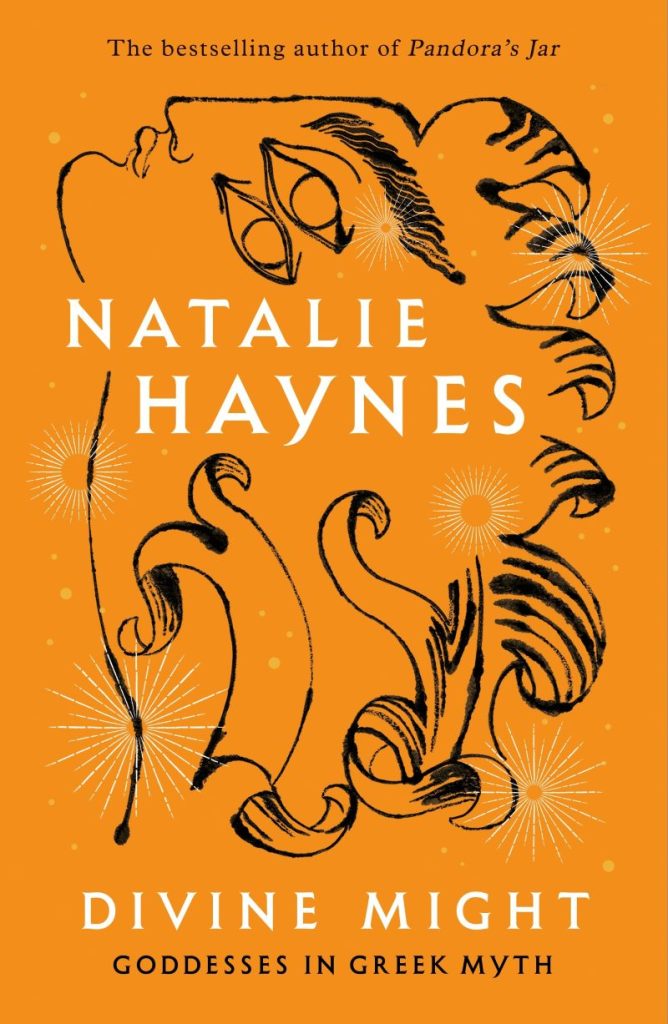Writer, broadcaster and stand-up comedian Natalie Haynes discusses her new book, Divine Might, how Hera is not always presented as a jealous, conniving shrew if we look closer, and, “turn the telescope around.”
‘Rock star mythologist’ Natalie Haynes is a writer of both fiction and non-fiction.
Her first novel, Amber Fury (2010) was shortlisted for the Scottish Crime Book of the Year Award. A Thousand Ships (2019) was published, translated into multiple languages, and wound up being shortlisted for the Women’s Prize for Fiction in 2020.
She has also written for publications such as The Guardian, The Independent, and has been a guest contributor for The Times since 2006. Her show on BBC Radio 4, Natalie Haynes Stands up for the Classics, has run for an impressive eight seasons.
Thirteen years after the publication of Amber Run, the author shows no signs of slowing down. Her newest non-fiction release, Divine Might, crackles with her characteristic wit and a blazing defiance that smoulders at the turn of every page.
It is a book that demands to be read.
If Pandora’s Jar was an examination of the mortal (and half-mortal) women from the classical myths many of us will have been taught in school, Divine Might is its immortal equivalent.
But it is so much more than a mere nod to the goddesses who either mortals on their quests, pursued them in vengeance for a perceived wrong, or cursed them when they felt it was deserved. It is a celebration of their mercy, their generosity, despair, and wrath.
Haynes takes these goddesses who are often side-lined in favour of likes of Zeus, Poseidon, and Hades, off the sub bench and lets them loose.
The Greek myths have fascinated us for centuries.
As Haynes herself said, “The stories have always found their audience.”
Until the last few years, we have watched these stories play out again and again through the increasingly uninspiring male lens.
“My parent’s generation grew up reading Mary Raneaux,” Haynes said. “There didn’t seem any point in doing [that] again – I’m not wildly interested in writing men’s stories when there are so many of them already.”
That would be an understatement. There are already hundreds of adaptations of Jason and the Argonauts, including the famous 1963 film. Meanwhile the story of Odysseus has become the epitome of flogging a dead horse, with a book, numerous films, and even a Simpsons episode.
Nowadays, the author said, people want more than the “mere sliver of a picture we were getting before.”
“For no good reason we decide to side-line women in Greek myth,” Haynes said. We tend to view these stories through a narrow telescope with a single lens. “I tend to turn that telescope around and say, ‘what happens now if we look at it this way? It [is] usually more illuminating than I could ever have anticipated.’

This is certainly the case with Hera. Often perceived merely as a jealous wife with a penchant for punishing, pursuing, and cursing the women unfortunate enough as to have drawn Zeus’ attention, as well as their demi-god children, Haynes does a spectacular job of adjusting the lens on these commonly held misconceptions.
Because, though we may not choose to see it, “Zeus is a patriarch who is quite happy to force himself on women,” and as Haynes remarks in her book, “much of her [Hera’s) behaviour seems to stem from a place of deep insecurity,” most likely a result of her predatory husband’s actions.
The goddess is vengeful and cruel, Haynes admits – there is more than enough evidence for this in the literature. Yet in Divine Might Hera is also identified as a loyal defender of those she chooses to back. “Hera is a most incredible defender of the Greeks against the Trojans.”
She delivers nuance to Hera, as a goddess and a wife. This nuance was always there; a blurry image behind the glass. Haynes merely wipes the surface clean so we can see it. The same can be said of her witty observations of Aphrodite, Artemis, and the other Goddesses featured in Divine Might.
Throughout her book, Haynes keeps one foot in the ancient, with another firmly planted in contemporary culture. Discussion of Hestia’s presence in the Fifth Homeric Hymn soon morphs into an observation of Playmobil’s depiction of the goddess (complete with an attempt at a very plastic sacred fire, apparently) before turning back to the ancient in the form of Hestia’s image on a kylix (a wide, shallow drinking cup) in the National Archaeological Museum of Tarquinia.
Likewise, stories about Demeter, Persephone, and the latter’s infamous kidnapping by Hades, god of the underworld, is interspersed with a sharp observation on the nature of love and our romanticisation of possession in the modern world.
Divine Might is already a bestseller, hailed as an “exquisitely written and endlessly enjoyable volume.” Whether we will see any more of Haynes over the next few years is an open-ended question. Yet the author remains open to the possibilities. “There are huge areas of the classics that have never been opened.” So watch this space.
Natalie Haynes will be at the Manchester Literature Festival on the 11 October to mark the publication of Divine Might. For more information, see the Manchester Literature Festival website.
She will also be at Neston Club, Parkgate, Wirral on 12 October at 7pm, tickets available here.
Featured image courtesy of James Betts




